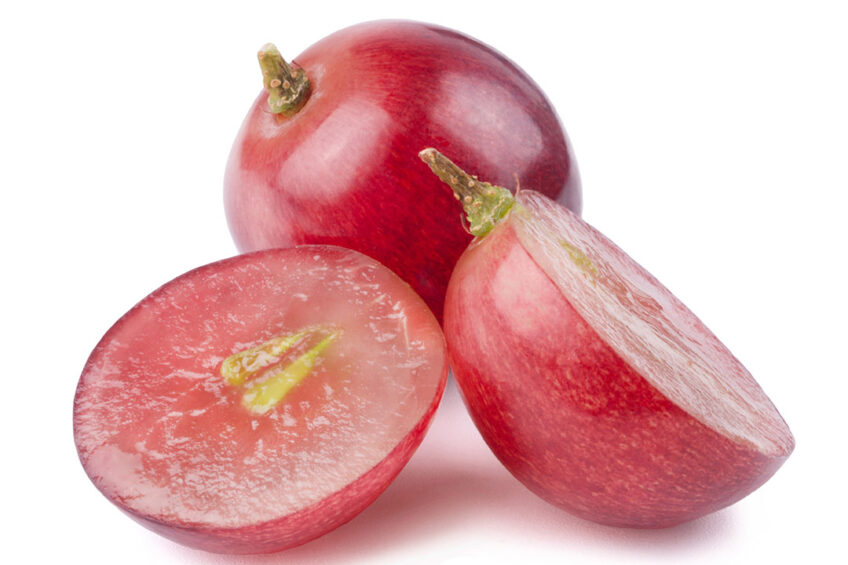Grape seed procyanidins can improve gut health

In a recent study, researchers found that adding grape seed procyanidins to weaner diets improves intestinal health and alleviates weaning-induced intestinal dysfunction, in several ways.
During weaning a variety of stressors combined with insufficient digestive function, predispose piglets to gastrointestinal disturbances and are important drivers of succession and modification of their gut microbiota. During weaning, the diet of piglets abruptly alters from a high-fat, low-carbohydrate, and non-fibrous milk diet to a low-fat, high-carbohydrate, and fibrous plant-based diet. Alterations in the gut microbiota composition and diversity caused by weaning disturb the intestinal immune system leading to post-weaning diarrhoea and increasing the pig’s susceptibility to diseases. Weaning stress can also induce oxidative damage to the intestine and disrupt the intestinal epithelial barrier function.
Grape seed procyanidins (GSPs) are polyphenolic compounds extracted from grape seeds and are known for their antioxidant, anti-inflammatory, antimicrobial, and immune-modulating properties. As weaning stress in piglets can cause dysbacteriosis and oxidative damage to the intestine, resulting in diarrhoea, the present study was conducted to determine whether administering GSPs can enhance intestinal antioxidant capacity and modulate the gut microbiota to improve the overall gut health in weaned piglets. In this study, crossbred piglets were assigned to one of the four experimental diets for the duration of 28 days:
the basal diet (control diet) without additives or,
the basal diet supplemented with either 50, 100, or 150 mg/kg of GSPs.
Intestinal antioxidant capacity
Studies show that the endogenous generation of NO and H2O2 and the downregulation in the expression of antioxidants suggest that weaning stress stimulates free-radical production and inhibits antioxidant capacity. In this study, researchers found dietary GSPs supplementation (Table 1) at different concentrations to significantly increase the antioxidant capacity of the three main enzymes: superoxide dismutase (SOD), glutathione peroxidase (GSH-Px), and catalase (CAT). In line with the activation of antioxidant capacity, GSPs significantly decreased the malondialdehyde (MDA) concentration. MDA is a commonly used marker of oxidative stress and antioxidant status.
The procyanidins improved the mRNA expression of the antioxidation-related genes for the superoxide dismutase, glutathione peroxidase and catalase enzymes. Procyanidins are natural polyphenolic compounds that activate the nuclear factor erythroid 2-related factor 2/heme oxygenase-1 (Nrf2/HO-1) signalling pathway and upregulate the expression of antioxidative and cytoprotective associated genes in the gut, collectively explaining why GSPs improve the antioxidative capacity in weaned piglets. It was clearly concluded that procyanidins maintain the intestinal redox balance by enhancing the intestinal antioxidative capacity.
Modulation of microbiota
The operational taxonomic units (OUT) which indicate the richness of the bacterial community, were enhanced by GSPs supplementation, with a significant enhancement observed in the caecal and colonic microflora. In the colon, the OTUs of the bacterial communities increased linearly and quadratically as dietary GSPs contents increased. In the caecum, the OTUs increased in a quadratic manner in response to the supplementation of dietary GSPs.
Compared with the control group, the relative abundance of Firmicutes increased by 58.7%, 30.7% and 52.3%, and that of Actinobacteria increased by 16.0%, 5.4% and 6.8% in the groups supplemented with 50, 100, and 150 mg/kg GSPs, respectively; conversely, the abundances of Bacteroidetes and Proteobacteria were reduced (68.9%, 32.6% and 60.7% for Bacteroidetes; 88.0, 97.3 and 79.8% for Proteobacteria) in these groups. Proteobacteria include many pathogenic bacteria, like Escherichia coli, Salmonella, Vibrio Cholerae, and Helicobacter pylori, which have been associated with inflammatory bowel diseases. GSPs supplementation also increased the relative abundance of Lactobacillus in the caecal microbiota. It was concluded, “GSPs consumption may shift the composition of the gut microbial community in weaning piglets into healthier patterns by withholding proliferation of pathogenic bacteria and promoting beneficial bacteria and maintaining intestinal homeostasis.”
Impact on short-chain fatty acids
In the current study, dietary GSPs supplementation enhanced (Table 2) the concentrations of acetic acid, propionic acid, and butyric acid, in the caecum and colon, in response to the increased abundance of Prevotella. However, it exerted little effect on the concentrations of iso-butyric acid, valeric acid, and isovaleric acid. Other studies have shown that increased concentrations of short-chain fatty acids (SCFAs) could decrease the intestinal pH thus restraining pathogenic bacterial growth and alleviating postweaning diarrhoea. Additionally, SCFAs decrease lipopolysaccharide translocation into the cell, which may contribute to minimising the effects of pathogenic bacteria.
Acetic acid generates ATP in muscle tissue and acts as an anti-inflammatory substance that aids in maintaining intestinal homeostasis. On the other side, propionic acid regulates liver cholesterol synthesis, while butyric acid acts as an important fuel for colonocytes and enhances intestinal barrier function by improving the gene expression of the tight junction proteins through activation of the adenosine monophosphate-activated protein kinase (AMPK) and inhibition of inflammatory mediators.
Enhancing immunity
Dietary intake of antioxidants may enhance immunocompetence by counteracting its side effects. Since polyphenolic compounds have direct effects on a variety of immune and inflammatory cell functions, dietary GSP supplementation has the potential to improve immunity. In their previous study, diets supplemented with GSP at doses of 100 or 150 mg/kg increased serum IgG, IgM, C4 and IL-2 concentrations. Serum IgG, IgA, IgM and C3, and C4 levels have been measured as indicators of humoral immunity and IL-2 as an important cytokine in the cell-mediated immune response. Their results demonstrated that dietary GSP enhances the humoral and cellular immune responses of weaned piglets by modulating the production of antibodies, complements, and cytokines.
In the same study, their results revealed that dietary addition of GSP ranging from 50 to 150 mg/kg reduces diarrhoea as effectively as antibiotics in weaned piglets. The incidence of diarrhoea in their study was 9.8% for the control group, 5.7% for the antibiotics group, and, on average, 6.5% for the GSP-supplemented piglets.
Article is based on the research paper “Grape seed procyanidins improve intestinal health by modulating gut microbiota and enhancing intestinal antioxidant capacity in weaned piglets”. Full paper can be accessed through Livestock Science Vol 264 (2022).
 Beheer
Beheer






 WP Admin
WP Admin  Bewerk bericht
Bewerk bericht